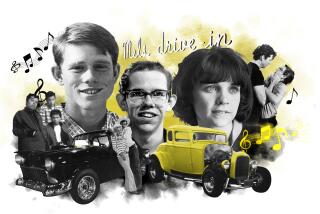MOVIE REVIEW : John Mellencamp Makes a Melancholic Film Debut
- Share via
In “Falling From Grace,” John Mellencamp, one of the leading practitioners of “heartland rock,” stars as a phenomenally successful singer who returns to his Indiana hometown. Directed by Mellencamp from a script by Larry McMurtry, the result is a curious, wayward blend of small-town anomie and intrigue and hero-worshipping narcissism.
The anomie smacks of McMurtry: not just his novels but several of the movies that have been made from them, such as “Hud” and “The Last Picture Show,” which he co-wrote. “Falling From Grace” (AMC Century 14) is an “original” script but it draws on many of the themes McMurtry has been fiddling with from the beginning. There’s a sharp, novelistic sense of observation in the way the characters bounce off each other’s time-worn hostilities. The dialogue has an emotional subtext--an undertow of feeling.
McMurtry is too honest to romanticize the homespun horrors of rural boredom; the film is about how Bud Parks (Mellencamp) realizes he can’t go home again, and the realization rings true. Success alienates Bud from his family, and from himself. He can’t quite believe that all of the tortuous, unresolved feelings he left behind--his suppressed rage toward his loutish, chicken-farm tycoon father (Claude Akins), his lingering love for his high-school flame (Kay Lenz)--remain with him, intact and still unresolved.
The small-town details, and a number of the performances, including those given by Akins, Lenz and Deirdre O’Connell as Bud’s sister, keep the film humming. As the Parks clan’s 80-year-old grandpa, Dub Taylor is in riotous, crotchety good spirits. Playing Bud’s watchful, principled wife, Mariel Hemingway starts out dimly but works up to some real emotion. She has that uneasy mixture of fortitude and helplessness that one can see in the jaw-set of celebrity wives.
Mellencamp, however, is in almost every scene, and he doesn’t provide much ballast. Many singers have made a triumphant transition to acting, including Willie Nelson and Levon Helm, who are roughly in Mellencamp’s territory. But charisma is a fickle thing. Bob Dylan was a big zero on the screen in his appearance in “Pat Garrett and Billy the Kid,” and in his own acting-directing opus “Renaldo and Clara.” Mellencamp doesn’t open himself up to the camera (he also doesn’t do any singing here, although his songs are on the soundtrack). Since the movie is an attempt to chart Bud’s inner turmoil, it’s a definite drawback that Bud doesn’t appear to have any insides. The performance is all scruffy posturing.
Perhaps if someone besides Mellencamp had directed, the film (rated PG-13) wouldn’t seem so navel-gazing. But a movie this laconic needs a stronger center. A much better film along similar lines, the 1973 “Payday,” had a feral, lacerating performance by Rip Torn; it would work as a companion piece to this film, and an object lesson, too. Mellencamp has some good, decent instincts as a director; he doesn’t spit-polish the scenario or romanticize the characters. But he romanticizes Bud’s agonies, and in a way that reflects back on himself. He’s lucky he has a full head of hair. Running his hands through it in shot after shot, Mellencamp uses his mane as a stage prop in a way no performer has since Veronica Lake.
‘Falling From Grace’
John Mellencamp: Bud Parks
Mariel Hemingway: Alice Parks
Claude Akins: Speck Parks
Dub Taylor: Grandpa Parks
A Columbia Pictures presentation of a Little b Pictures production. Director John Mellencamp. Producer Harry Sandler. Screenplay Larry McMurtry. Cinematographer Victor Hammer. Editor Dennis Virkler. Costumes Clark Foster. Production design George Corsillo. Art director Todd Hatfield. Set decorator Sandi Cook. Running time: 1 hour, 46 minutes.
MPAA-rated PG-13.
More to Read
Only good movies
Get the Indie Focus newsletter, Mark Olsen's weekly guide to the world of cinema.
You may occasionally receive promotional content from the Los Angeles Times.







